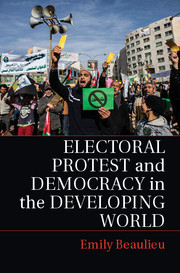Book contents
- Frontmatter
- Dedication
- Contents
- Tables and Figures
- Acknowledgments
- 1 Introduction
- 2 Elite Bargaining and Elections in the Developing World
- 3 Causes of Electoral Protest
- 4 Election Day and Its Aftermath
- 5 Democratic Consequences of Electoral Protest
- 6 Conclusion
- Appendix A Data Description and Robustness Checks
- Appendix B. Boycotts
- Appendix C. Post-Election Mass Demonstrations
- Appendix D. Election-Related Reforms
- References
- Index
1 - Introduction
Published online by Cambridge University Press: 05 June 2014
- Frontmatter
- Dedication
- Contents
- Tables and Figures
- Acknowledgments
- 1 Introduction
- 2 Elite Bargaining and Elections in the Developing World
- 3 Causes of Electoral Protest
- 4 Election Day and Its Aftermath
- 5 Democratic Consequences of Electoral Protest
- 6 Conclusion
- Appendix A Data Description and Robustness Checks
- Appendix B. Boycotts
- Appendix C. Post-Election Mass Demonstrations
- Appendix D. Election-Related Reforms
- References
- Index
Summary
On June 15, 2009, a week after opposition candidate Mir Hussein Moussavi lost the Iranian presidential election, the streets of the capital city of Tehran were overflowing with hundreds of thousands of protesters. On losing, Moussavi characterized the victory of the incumbent, Mahmoud Ahmadinejad, as a “coup,” made a public plea to the international community not to accept the results of the election (Borger and Black 2009), and called on his supporters to rally in protest (Worth and Fathi 2009). Iranian citizens responded with the largest public demonstrations in Iran since the Islamic Revolution in 1979 (Fathi 2009).
Not more than six months later, the main opposition candidate for president in Afghanistan, Abdollah Abdollah, boycotted that country's runoff election. When his opponent – the current Afghan president, Hamid Karzai – reluctantly consented to a runoff (after asserting he had won the first round of voting outright), Abdollah, who had finished second, demanded a number of administrative changes to prevent a recurrence of electoral malfeasance, which he alleged had occurred during the first round of the election. Formal talks ensued, with no small amount of U.S. diplomatic involvement, but ultimately this effort did not persuade Karzai to meet Abdollah's demands. The challenger subsequently boycotted the election, refusing to participate in the second round of voting (Filkins and Rubin 2009).
- Type
- Chapter
- Information
- Publisher: Cambridge University PressPrint publication year: 2014

